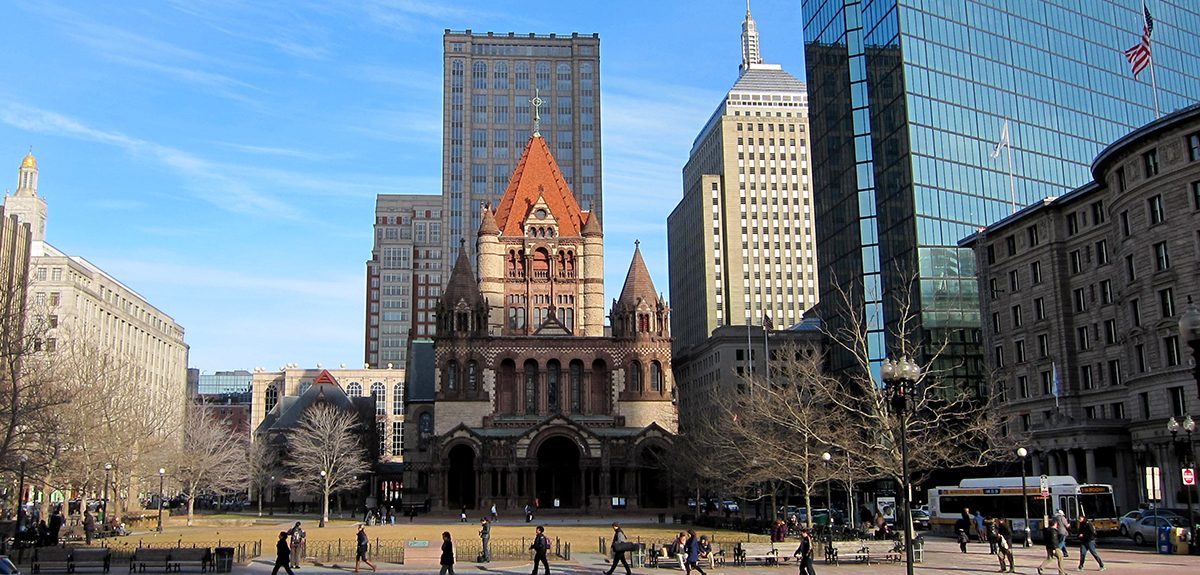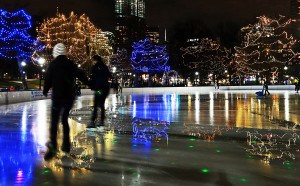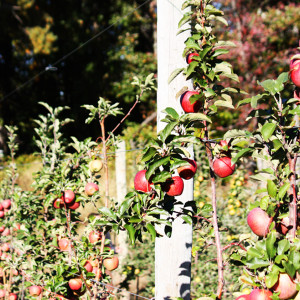The Boston Literary Cultural District Is Officially Official [Updated]

The new Literary Cultural District spans from Copley Square all the way to Beacon Hill and Downtown Crossing. (See map below.) / Copley Square photo by NCinDC on Flickr
Updated from August 19, 2014:
It’s official—Boston is now the home of the country’s first Literary Cultural District. The Mass. Cultural Council approved the designation in August, and the district was made “official official” on October 2, i.e. a launch event took place at Suffolk University with the presence of City Council members (Pressley, Wu, Zakim) and a formal website went live: bostonlitdistrict.org (.org, .org!)
The campaign for an “LCD” was spearheaded by GrubStreet, helmed by founder executive director Eve Bridburg, and several other local organizations including the BPL, the Boston Book Festival, Emerson College, Suffolk University, and more.
“I’m thrilled to announce the designation of Boston’s second Cultural District,” said Anita Walker, the executive director of the Massachusetts Cultural Council, in a press release. [The Fenway Cultural District was the first.] “We recently celebrated the designation of the first 25 Massachusetts Cultural Districts and I’m delighted to add the Literary Cultural District to this extraordinary group of communities.”
It was Walker who first gave Bridburg the idea to pursue the establishment of a Literary Cultural District. City Councilors Ayanna Pressley and Michelle Wu supported the pitch earlier this year, with Boston City Council voting unanimously in favor of a Literary Cultural District in Boston in late June, pushing the proposal along to the Mass. Cultural Council.
According to the MCC:
A cultural district is a compact, walkable area of a community with a concentration of cultural facilities, activities, and assets. MCC’s Cultural Districts Initiative grew out of an economic stimulus bill passed by the Massachusetts Legislature in 2010.
Boston’s new Literary Cultural District will encompass the area from Copley Square to Downtown Boston (see map below). The establishment of the LCD means residents can look forward to more events like the Boston Book Festival, a walkable map of the district, increased awareness of the city’s literary history, and plenty more ideas that GrubStreet and co. have in mind.
Previously, from June 26, 2014:
Local Groups Want an Official Literary Cultural District in Boston
City Council voted unanimously in favor of the resolution.
Above, the proposed boundaries of a Literary Cultural District in Boston, including 80 notable sites in the area compiled by GrubStreet. View in Google Maps.
The city of Boston is one step closer to establishing a Literary Cultural District. Several local organizations have been planning and pushing the idea for some time, hoping to make official a fact we already know: that Boston has a strong literary tradition that spans our rich history and still permeates local culture today.
City Council voted on a resolution—presented by City Councilors Ayanna Pressley and Michelle Wu—on Wednesday. They voted unanimously for Boston to have an official Literary Cultural District.
The Idea:
The story goes that two years ago, GrubStreet founder and executive director Eve Bridburg was talking with Anita Walker, executive director of the Massachusetts Cultural Council, lamenting about the lack of a spotlight on Boston’s literary events. Walker suggested pursuing the establishment of a cultural district—the state already recognizes about two dozen cultural districts, including the Fenway and Central Square Cultural Districts.
Helmed by GrubStreet, a group of notable local organizations—including the BPL, the Boston Book Festival, Emerson College, Suffolk University, and more—joined forces to support the pitch for a Literary Cultural District. GrubStreet hired a coordinator, Larry Lindner, to run the process, which involved a lot of research and planning, including putting together a list of some 80 literary landmarks in downtown Boston, Back Bay, and Beacon Hill, where the district is being proposed. (Browse map above.)
What a Literary Cultural District Would Mean:
In a word, legitimacy. Aside from plaques and statues, such as a new Edgar Allan Poe statue slated for October, creating a Literary Cultural District means making the area an attraction for literature enthusiasts and tourists. They’re not fishing for tax dollars or funding, but rather just want to make it known: Boston’s lit scene is so strong we deemed it official.
The organizations involved want more events like the Boston Book Festival. They want more plaques and statues. They want to make multiple mobile apps for people to tour the area—a women’s tour, a transcendentalists tour, and so on. They want more poems on the T, more little free libraries, a central events calendar, and more. You get the idea.
Where It Stands, and What’s Next:
After a hearing in May and a working session in early June with Councilors Pressley (who sponsored the Fenway Cultural District) and Wu (chair of the Committee on Arts & Culture), the two presented the resolution to City Council on Wednesday. The council voted unanimously in favor of the cultural district.
The next step is submitting an application to the Massachusetts Cultural Council, which Lindner plans to do Thursday. The MCC considers many aspects before voting. In addition to the scope of the project, the assessment includes visiting the site of the proposed district and addressing a slew of questions like, “Is it walkable?”
The MCC will vote on the Literary Cultural District the third week of August. If all goes well, the Literary Cultural District will be official by fall, when banner events for Boston’s literary scene, like the Boston Book Festival, are scheduled to take place.
Do We Need a Literary Cultural District?
The diplomatic answer is this: We need it no more and no less than we need the already existing Central Square and Fenway Cultural Districts.
The truth is, all the potential projects that would emerge from the establishment of a Literary Cultural District don’t really require jumping through political hoops. Want an app that acts as a tour guide to notable transcendentalist landmarks in Boston? Surely a student at MIT could whip one up. Want shops on Newbury Street to display poems in their storefronts? Plenty would probably be amenable if you asked. And the thing is, establishing a district would ensure none of this.
Ultimately, the purpose of making the Literary Cultural District official is legitimacy. That, and wrapping up the entire literary culture of Boston into one pretty package. An official website or tour guide app might gather together fun facts like this one: the Omni Parker House Hotel used to be a popular hangout spot for Emerson, Thoreau, Longfellow, Holmes, and Dickens; Malcolm X was a busboy there; and Ho Chi Minh was a baker.
The details and boundaries of the proposed district is flexible, Lindner says. Admittedly, they’re asking for quite a big chunk of real estate—the Boston Common, Public Garden, and surrounding areas in every direction. If the MCC says it’s too big and “unwalkable,” then it’s back to the drawing board. However, “you really could take the entire city and make it a Literary Cultural District,” Lindner says.


